Coronavirus in Scotland: What is known about care home deaths?
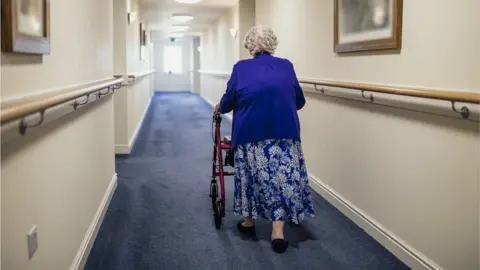 Getty Images
Getty ImagesNearly half of Scotland's 4,193 coronavirus deaths have been linked to care homes. So what do we know about these men and women who succumbed to a disease that has ravaged the world? Surprisingly, the answer is very little.

The first Alan Wightman knew about virus-related deaths in his mother's care home came from an unexpected phone call.
"Have you seen The Courier?" the home's deputy manager asked.
The local newspaper was reporting that an outbreak at Scoonie House in Fife had resulted in 16 positive cases, and two deaths.
"If that article had not been published, they'd never have phoned me," says Alan. "Their hand was forced."
That phone call came on 1 May and five days later Alan's 88-year-old mother Helen became another coronavirus fatality.
 Alan Wightman
Alan WightmanAccording to the Care Inspectorate - Scotland's regulatory body for the sector - care providers are under "no statutory obligation" to notify residents, or their families, of an outbreak in their homes.
Caring Homes - the private company that runs Scoonie House - said its residents were an "absolute priority", and everything had been done to keep them well. It had "proactively" sourced the right protective equipment for staff, engaged in routine testing and stopped new admissions.
The company added: "We have sought to be transparent with relatives and they have received regular communications from our home manager and senior leadership team." The one thing it didn't say was how many deaths linked to Covid-19 had happened.
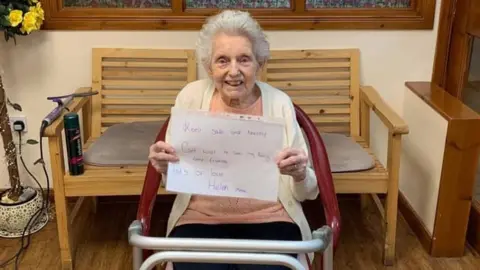 Alan Wightman
Alan WightmanAlan doesn't dispute his mother's care and he was thankful for the regular updates he was given.
What he does question is how coronavirus still managed to take hold, despite the measures employed. He also questions why Caring Homes won't make public its death numbers. Alan's view is that care homes are "hiding, where they can, behind confidentiality".
Caring Homes is not the only provider reluctant to reveal how many fatalities could be attributed to the pandemic.
So, what do we know about deaths? Officially, there have been suspected cases in two-thirds of homes. And we know coronavirus has claimed slightly more lives in care homes (1,950) than in hospitals (1,945).
Data also reveals that since mid-March there have been 2,365 "excess deaths" in Scottish care homes as measured against the five-year average.
Weekly figures published by National Records of Scotland - which include confirmed and suspected coronavirus deaths - show what the situation is at health board level. But is it possible to map every single care home death by address and provider?

Over many weeks I sent hundreds of emails to the 1,080 public and private homes looking after Scotland's elderly.
But most declined to say how many virus-related deaths they had reported to the Care Inspectorate. The regulatory body - as well as the Scottish government - also refused to release a breakdown.
The Care Inspectorate also declined to disclose the data via a freedom of information request, pointing out that infections and death numbers "may not necessarily be related to a service's quality of care, hygiene standards, and use of PPE".
The watchdog added: "To release information, even at provider level, could have significant impact on the ability of the provider, and consequently their services, to function commercially in already challenging economic circumstances.
"Releasing information at this level would also likely impact on their ability to engage new staff and/or attract new residents."
The government said data needed to be accurate and published in a way that protected people's right to confidentiality.
Faced with very little official figures, I searched online news articles, obituaries, and death notices and contacted social media groups set up by those who had lost loved ones in care homes.
But despite casting a wide net, I could find only 93 care homes in which 588 residents had died - that's 30% of all the 1,950 confirmed and suspected elderly deaths.
Of these, 78% were reported at privately-run homes. For context, 63% of the sector is private, with the remainder being non-profit (24%), council (12%), and health board (1%).
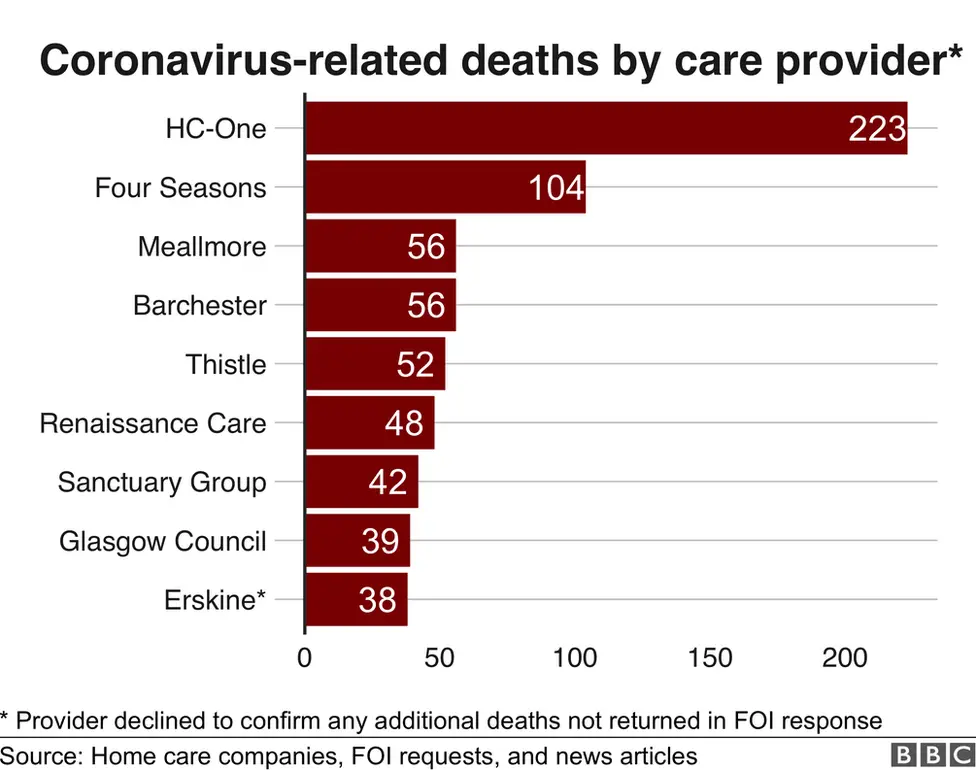
- HC-One - which runs 50-plus care homes in Scotland - reported the most deaths (223), comparative to Four Seasons (104) which operates 30-plus homes.
But many providers would not even confirm figures that had appeared in the media. For example, Advinia Care Homes Limited declined to reveal numbers despite freedom of information requests and news stories reporting at least 66 deaths in five of its homes.
It simply said it would not release such data "out of respect to the families who have lost someone".
Helen Wightman's son Alan says he is dismayed at the lack of openness, adding "they [the care homes] are not providing answers".
As well as private homes failing to release death figures - half a dozen local authorities have also declined to publish numbers.
The media reported 15 deaths at council-run Crosslet House, but West Dunbartonshire said patient confidentiality meant it was "unable to confirm" fatalities.
Robert Kilgour - executive chairman of Renaissance Care - told BBC Scotland councils should provide figures for deaths.
He said: "If they have nothing to hide then they have nothing to fear. There are no data protection issues at all. This is a smokescreen for them to hide behind."
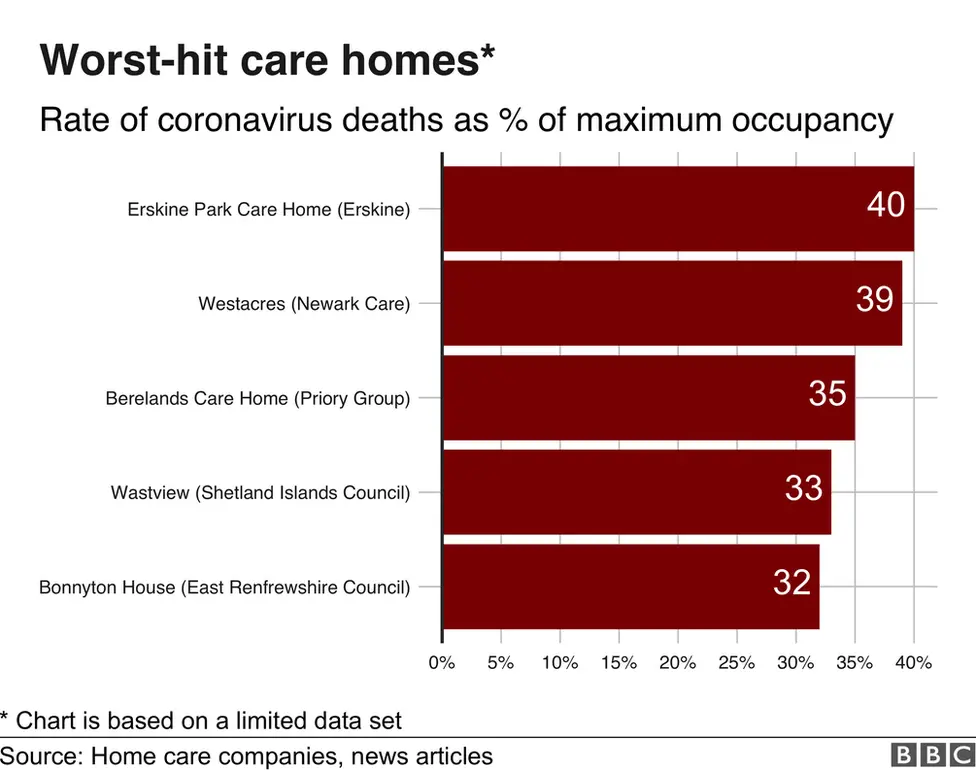
- If you divide the number of deaths by the total number of beds you can come up with an approximate death rate per home. It's a basic calculation, but in the absence of little data it gives an insight.
What about deaths by council area?
While weekly figures published by National Records of Scotland use local authority areas they don't reveal which specific homes have reported deaths.
Through the crowdsourced data I had found, I built maps highlighting possible virus hot spots.
Some show evenly-spread points across councils like Glasgow, whereas we see clusters of care home deaths in the east of Renfrewshire, and eastern Edinburgh.



The limited data set also allows us to calculate what percentage of deaths in a council area can be attributed to a single care home.
- Argyll and Bute - 65% - Ashgrove Care Home
- Clackmannanshire - 40% - Orchard Care Centre
- Highland - 63% - Home Farm
- North Ayrshire - 47% - Fullarton Care Home
- Scottish Borders - 62% - Saltgreens Care Home
- Shetland - 100% - Wastview Care Home
- South Ayrshire - 43% - Berelands Care Home
How does Scotland compare to other countries?
Analysis of global figures by academics at the London School of Economics (LSE) suggests care home residents were more likely to die of Covid-19 in the UK than in any of the other major European countries, apart from Spain.
The proportion of residents dying in UK homes was a third higher than in Ireland or Italy, about double that in France and Sweden, and 13 times higher than in Germany.
If we look at Scotland as an individual nation and use the LSE's analysis, the country's care homes would see 5% of deaths attributed to the pandemic.
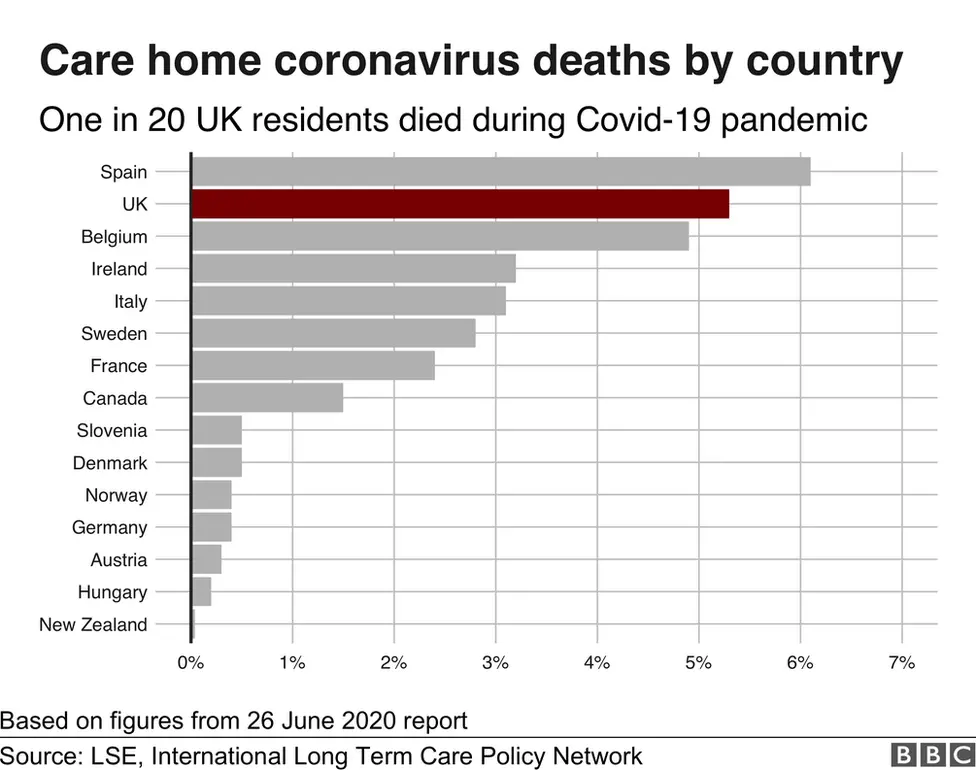
However, the report notes that "international comparisons are difficult" due to differences in testing; how deaths are recorded, and variations in the definition of "care home".
A Scottish government spokesman said "the calculation uses a snapshot day and therefore doesn't account for the flow (in and out) of care home residents across the year. In our view, it provides at best a rough proxy measure".
One of the report's authors, Dr David Henderson from Edinburgh Napier University, said nobody knows how many people in Scotland are in care homes at any given time and so "an accurate denominator is beyond us".
He added that the "data gap" had been "cruelly exposed by the pandemic".
The Scottish government has pledged to review social care in the wake of coronavirus which had "shone a light" on areas that needed to be improved.
That review has been welcomed by Alan Wightman who is still trying to piece together how his mother Helen contracted coronavirus.
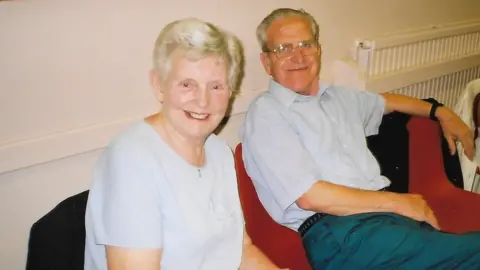 Alan Wightman
Alan Wightman
- SYMPTOMS: What are they and how to guard against them?
- 40,000 DEATHS: Could they have been prevented?
- FACE MASKS: When should you wear one?
- TESTING: Who can get a test and how?

